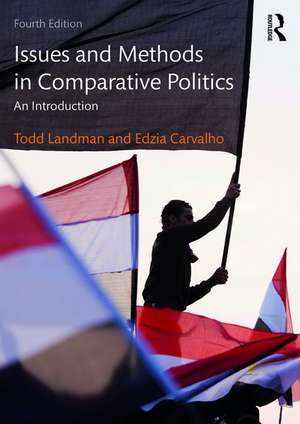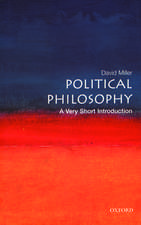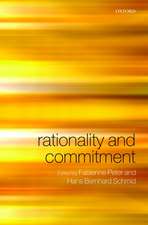Issues and Methods in Comparative Politics: An Introduction
Autor Todd Landman, Edzia Carvalhoen Limba Engleză Paperback – 5 ian 2017
- Additional contemporary case studies including the democratisation of technology and the Arab Spring;
- Detailed discussion of regression analysis and diffusion;
- More analysis of justice, inequality, and compliance;
- Reflection on new methods and treatments of contemporary comparative politics.
| Toate formatele și edițiile | Preț | Express |
|---|---|---|
| Paperback (1) | 350.83 lei 3-5 săpt. | +28.95 lei 4-10 zile |
| Taylor & Francis – 5 ian 2017 | 350.83 lei 3-5 săpt. | +28.95 lei 4-10 zile |
| Hardback (1) | 993.02 lei 6-8 săpt. | |
| Taylor & Francis – 9 dec 2016 | 993.02 lei 6-8 săpt. |
Preț: 350.83 lei
Nou
Puncte Express: 526
Preț estimativ în valută:
67.13€ • 70.28$ • 55.55£
67.13€ • 70.28$ • 55.55£
Carte disponibilă
Livrare economică 17-31 martie
Livrare express 28 februarie-06 martie pentru 38.94 lei
Preluare comenzi: 021 569.72.76
Specificații
ISBN-13: 9780415538305
ISBN-10: 0415538300
Pagini: 372
Ilustrații: 34 Tables, black and white; 40 Line drawings, black and white
Dimensiuni: 174 x 246 x 20 mm
Greutate: 0.62 kg
Ediția:Revizuită
Editura: Taylor & Francis
Colecția Routledge
Locul publicării:Oxford, United Kingdom
ISBN-10: 0415538300
Pagini: 372
Ilustrații: 34 Tables, black and white; 40 Line drawings, black and white
Dimensiuni: 174 x 246 x 20 mm
Greutate: 0.62 kg
Ediția:Revizuită
Editura: Taylor & Francis
Colecția Routledge
Locul publicării:Oxford, United Kingdom
Public țintă
Postgraduate and UndergraduateCuprins
Introduction
PART I: WHY, HOW, AND PROBLEMS OF COMPARISON
1. Why Compare Countries?
6. Economic Development and Democracy
13. Common Themes and Different Comparisons
PART I: WHY, HOW, AND PROBLEMS OF COMPARISON
1. Why Compare Countries?
- Reasons for comparison
The science in political science
Scientific terms and concepts
Summary
Further reading
- Methods of comparison
Comparing many countries
Comparing few countries
Single country studies as comparison
Choosing countries and problems of comparison
Summary
Further reading
- Starting assumptions
Measuring concepts
Basic regression analysis
Extending the basic regression model
Limitations to global comparative analysis
Summary
Further reading
- Assumptions
Case selection and research design
Combining quantitative and qualitative comparison
Limitations of few-country comparisons
Summary
Further reading
- Functions of single-country studies
Raising observations in single-country studies
Limitations of single-study studies
Summary
Further reading
6. Economic Development and Democracy
- The research problem
Comparing many countries
Comparing few countries
Single-country studies
Summary
Further reading
- The research problem
Comparing many countries
Comparing few countries
Single-country studies
Summary
Further reading
- The research problem
Comparing many countries
Comparing few countries
Single-country studies
Summary
Further reading
- The research problem
Comparing many countries
Comparing few countries
Single-country studies
Summary
Further reading
- The research problem
Comparing many countries
Comparing few countries
Single-country studies
Summary
Further reading
- The research problem
Comparing many countries
Comparing few countries
Single-country studies
Summary
Further reading
- Research problems
Comparing many countries
Comparing few countries
Single-country studies
Summary
Further reading
13. Common Themes and Different Comparisons
- Methodological trade-offs
Building theory
Conclusion: drawing the lessons
Further reading
Full circle
New methods
Maintaining relevance
Summary
Further reading
Notă biografică
Todd Landman is Professor of Political Science and Pro Vice Chancellor of the Faculty of Social Sciences at the University of Nottingham, UK. He has published Democracy and Human Rights (2013), Studying Human Rights (Routledge 2006), Protecting Human Rights (2005), co-authored Measuring Human Rights (Routledge 2009), and edited Human Rights (Volumes I-IV) (2009) and Sage Handbook of Comparative Politics (2009).
Edzia Carvalho is Lecturer in Politics in the School of Social Sciences at the University of Dundee, UK. She is co-author of Measuring Human Rights (Routledge 2009).
Edzia Carvalho is Lecturer in Politics in the School of Social Sciences at the University of Dundee, UK. She is co-author of Measuring Human Rights (Routledge 2009).
Recenzii
'This book fills a longstanding gap in the literature for a clear and concise primer on the purpose and methods of comparative politics. It is also an excellent starting point for scholars and students alike who wish to come to grips with the most important arguments, findings and methodological challenges in the study of democracy and human rights. Required reading for budding comparativists, it should also serve as a benchmark which seasoned scholars should regularly revisit.' - Robert Mattes, University of Strathclyde, UK.
'I have relied on this book for years to teach my masters students how to think through their methods choices. It provides a much-needed neutral overview of the trade-offs between Large-N and Small-N methods, presenting these options as the "methodological universe of the field" of comparative politics. The book presents complex material in a clear way – and is useful both in teaching and in my own research.' - Sherrill Stroschein, University College London, UK
'Todd Landman and Edzia Carvalho have written a genuine multi-method textbook. They introduce students into substantive issues through the lenses of contrasting methods. Pluralistic and reflexive, well-structured, thoughtful, and up-to-date, Issues and Methods in Comparative Politics nicely fulfils its didactic promise. Students will encounter a most stimulating guide to the contemporary study of politics.' - Andreas Schedler, CIDE, Mexico City
'I have relied on this book for years to teach my masters students how to think through their methods choices. It provides a much-needed neutral overview of the trade-offs between Large-N and Small-N methods, presenting these options as the "methodological universe of the field" of comparative politics. The book presents complex material in a clear way – and is useful both in teaching and in my own research.' - Sherrill Stroschein, University College London, UK
'Todd Landman and Edzia Carvalho have written a genuine multi-method textbook. They introduce students into substantive issues through the lenses of contrasting methods. Pluralistic and reflexive, well-structured, thoughtful, and up-to-date, Issues and Methods in Comparative Politics nicely fulfils its didactic promise. Students will encounter a most stimulating guide to the contemporary study of politics.' - Andreas Schedler, CIDE, Mexico City
Descriere
Building on the strengths of the third edition, this highly regarded textbook continues to provide the best introduction to the strategies of comparative research in political science. Divided into three parts, the book begins by examining different methods, applying these methods to dominant issues in comparative politics using a wealth of topical examples from around the world, and then discusses the new challenges in the area.















